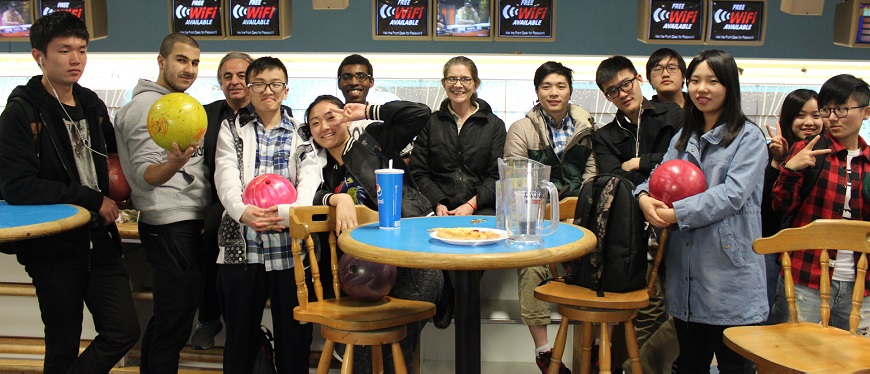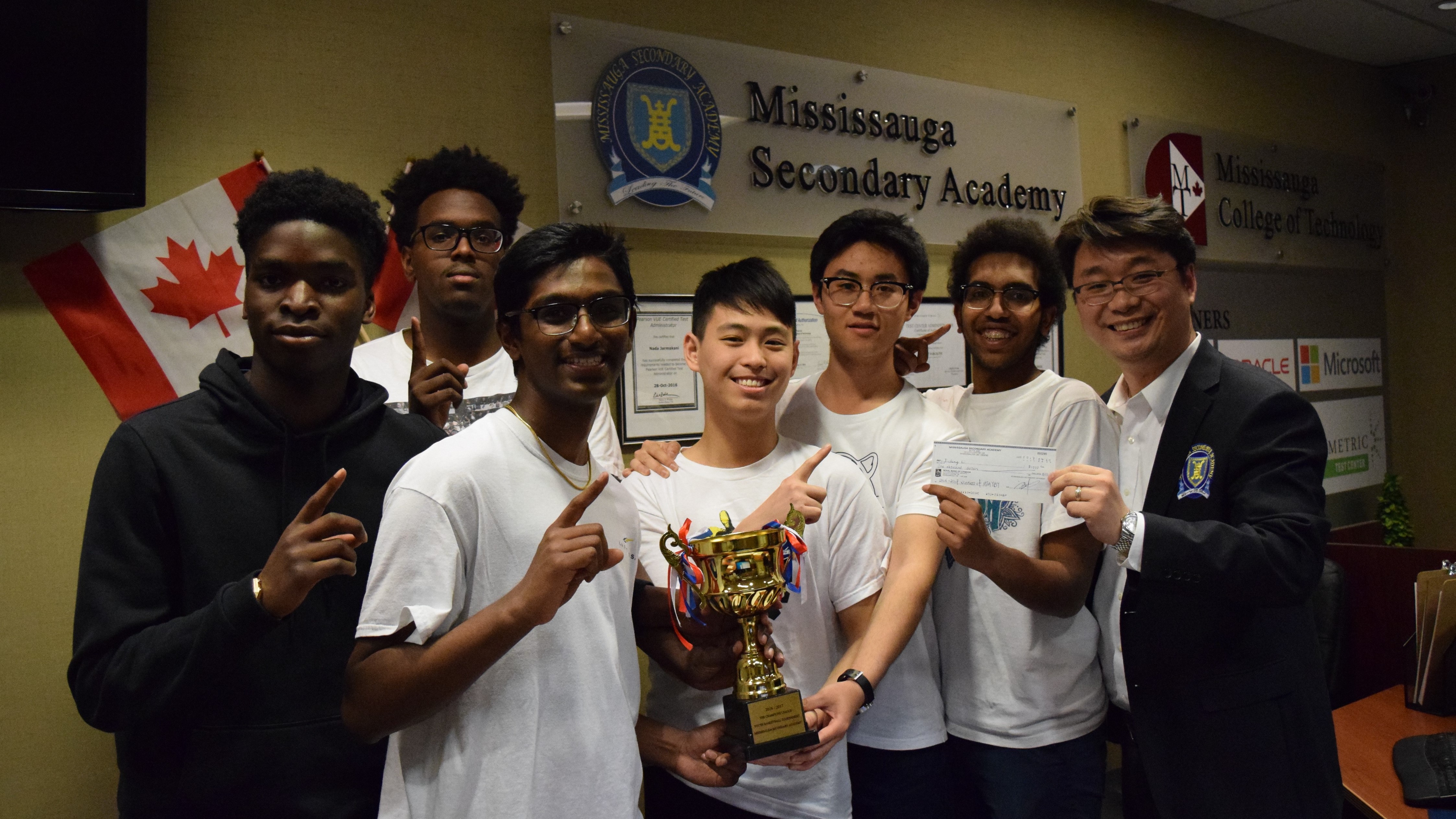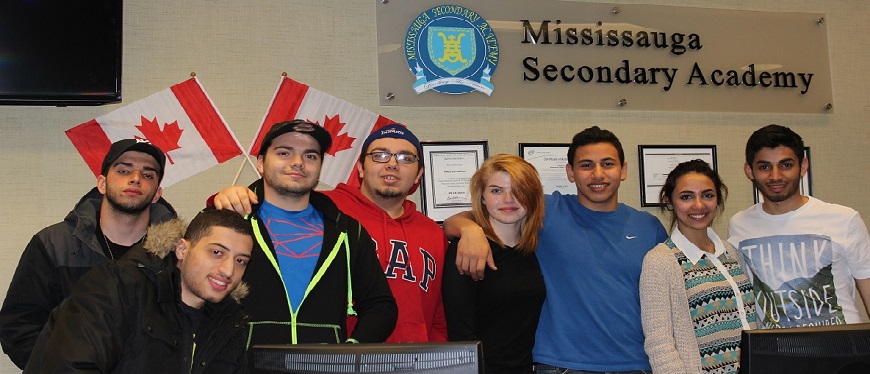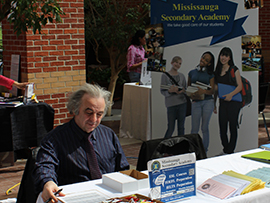
Grade 12 credit courses
Visual Arts, Grade 12, University/College Preparation (AVI4M)
This course focuses on enabling students to refine their use of the creative process when creating and presenting two- and three-dimensional artworks using a variety of traditional and emerging media and technologies. Students will use the critical analysis process to deconstruct artworks and explore connections between art and society. The studio program enables students to explore a range of materials, processes, and techniques that can be applied in their art production. Students will also make connections between various works of art in personal, contemporary, historical, and cultural contexts.
Prerequisite: Visual Arts, Grade 11, University/College Preparation
Canadian and World Issues: A Geographic Analysis, Grade 12, University (CGW4U)
In this course, students will address the challenge of creating a more sustainable and equitable world. They will explore issues involving a wide range of topics, including economic disparities, threats to the environment, globalization, human rights, and quality of life, and will analyze government policies, international agreements, and individual responsibilities relating to them. Students will apply the concepts of geographic thinking and the geographic inquiry process, including the use of spatial technologies, to investigate these complex issues and their impacts on natural and human communities around the world.
Prerequisite: Any university or university/college preparation course in Canadian and world studies, English, or social sciences and humanities
World Geography: Human Patterns and Interactions, Grade 12, University (CGU4U)
This course examines how humans interact with their natural environments and with each other. Students will study the influence of spatial, political, economic, and social factors on settlement patterns, human migration, cultural change, globalization, and environmental trends. Students will use geo-technologies and skills of geographic inquiry and analysis to extend their knowledge of human geography to identify and explain current trends and patterns and predict future ones.
Prerequisite: Any university or university/college preparation course in Canadian and world studies, English, or social sciences and humanities
Canada: History, Identity, and Culture, Grade 12, University (CHI4U)
This course traces the history of Canada, with a focus on the evolution of our national identity and culture as well as the identity and culture of various groups that make up Canada. Students will explore various developments and events, both national and international, from precontact to the present, and will examine various communities in Canada and how they have contributed to identity and heritage in Canada. Students will investigate the development of culture and identity, including national identity, in Canada and how and why they have changed throughout the country’s history. They will extend their ability to apply the concepts of historical thinking and the historical inquiry process, including the interpretation and analysis of evidence, as they investigate the people, events, and forces that have shaped Canada.
Prerequisite: Any university or university/college preparation course in Canadian and world studies, English, or social sciences and humanities
World History: The West and the World, Grade 12, University (CHY4U)
This course traces major developments and events in world history since approximately 1450. Students will explore social, economic, and political changes, the historical roots of contemporary issues, and the role of conflict and cooperation in global interrelationships. They will extend their ability to apply the concepts of historical thinking and the historical inquiry process, including the interpretation and analysis of evidence, as they investigate key issues and ideas and assess societal progress or decline in world history.
Prerequisite: Any university or university/college preparation course in Canadian and world studies, English, or social sciences and humanities
International Languages, Level 4, University (LBADU – LYXDU)
This course prepares students for university studies in the international language. Students will enhance their ability to use the language with clarity and precision and will develop the language skills needed to engage in sustained conversations and discussions, understand and evaluate information, read diverse materials for both study and pleasure and write clearly and effectively. Students will also have opportunities to add to their knowledge of the culture of countries where the language is spoken through the use of community resources and computer technology.
Prerequisite: International Languages, Level 3, University Preparation
Computer Science, Grade 12, University (ICS4U)
This course enables students to further develop knowledge and skills in computer science. Students will use modular design principles to create complex and fully documented programs, according to industry standards. Student teams will manage a large software development project, from planning through to project review. Students will also analyze algorithms for effectiveness. They will investigate ethical issues in computing and further explore environmental issues, emerging technologies, areas of research in computer science, and careers in the field.
Prerequisite: Introduction to Computer Science, Grade 11, University Preparation
English, Grade 12, University (ENG4U)
This course emphasizes the consolidation of the literacy, communication, and critical and creative thinking skills necessary for success in academic and daily life. Students will analyze a range of challenging literary texts from various periods, countries, and cultures; interpret and evaluate informational and graphic texts; and create oral, written, and media texts in a variety of forms. An important focus will be on using academic language coherently and confidently, selecting the reading strategies best suited to particular texts and particular purposes for reading, and developing greater control in writing. The course is intended to prepare students for university, college, or the workplace.
Prerequisite: English, Grade 11, University Preparation
English, Grade 12, College (ENG4C)
This course emphasizes the consolidation of literacy, communication, and critical and creative thinking skills necessary for success in academic and daily life. Students will analyze a variety of informational and graphic texts, as well as literary texts from various countries and cultures, and create oral, written, and media texts in a variety of forms for practical and academic purposes. An important focus will be on using language with precision and clarity and developing greater control in writing. The course is intended to prepare students for college or the workplace.
Prerequisite: English, Grade 11, College Preparation
Core French, Grade 12, University (FSF4U)
This course draws on a variety of themes to promote the extensive development of French language skills. Students will consolidate their oral skills as they discuss literature, culture, and current issues. They will read a variety of texts and will write a formal essay. The use of correct grammar and appropriate language conventions in both spoken and written French will be emphasized throughout the course.
Prerequisite: Core French, Grade 11, University Preparation
Advanced Functions, Grade 12, University (MHF4U)
This course extends students’ experience with functions. Students will investigate the properties of polynomial, rational, logarithmic, and trigonometric functions; develop techniques for combining functions; broaden their understanding of rates of change; and develop a facility in applying these concepts and skills. Students will also refine their use of the mathematical processes necessary for success in senior mathematics. This course is intended both for students taking the Calculus and Vectors course as a prerequisite for a university program and for those wishing to consolidate their understanding of mathematics before proceeding to any one of a variety of university programs.
Prerequisite: Functions, Grade 11, University Preparation, or Mathematics for College Technology, Grade 12, College Preparation
Calculus and Vectors, Grade 12, University (MCV4U)
This course builds on students’ previous experience with functions and their developing understanding of rates of change. Students will solve problems involving geometric and algebraic representations of vectors and representations of lines and planes in three-dimensional spaces; broaden their understanding of rates of change to include the derivatives of polynomial, sinusoidal, exponential, rational, and radical functions; and apply these concepts and skills to the modelling of real-world relationships. Students will also refine their use of the mathematical processes necessary for success in senior mathematics. This course is intended for students who choose to pursue careers in fields such as science, engineering, economics, and some areas of business, including those students who will be required to take a university-level calculus, linear algebra, or physics course.
Prerequisite: Note: The new Advanced Functions course (MHF4U) must be taken prior to or concurrently with Calculus and Vectors (MCV4U).
Mathematics of Data Management, Grade 12, University (MDM4U)
This course broadens students’ understanding of mathematics as it relates to managing data. Students will apply methods for organizing and analyzing large amounts of information; solve problems involving probability and statistics; and carry out a culminating investigation that integrates statistical concepts and skills. Students will also refine their use of the mathematical processes necessary for success in senior mathematics. Students planning to enter university programs in business, the social sciences, and the humanities will find this course of particular interest.
Prerequisite: Functions, Grade 11, University Preparation, or Functions and Applications, Grade 11, University/College Preparation
Earth and Space Science, Grade 12, University (SES4U)
This course develops students’ understanding of Earth and its place in the universe. Students will investigate the properties of and forces in the universe and solar system and analyze techniques scientists use to generate knowledge about them. Students will closely examine the materials of Earth, its internal and surficial processes, and its geological history, and will learn how Earth’s systems interact and how they have changed over time. Throughout the course, students will learn how these forces, processes, and materials affect their daily lives. The course draws on biology, chemistry, physics, and mathematics in its consideration of geological and astronomical processes that can be observed directly or inferred from other evidence.
Prerequisite: Science, Grade 10, Academic
Biology, Grade 12, University (SBI4U)
This course provides students with the opportunity for in-depth study of the concepts and processes that occur in biological systems. Students will study theory and conduct investigations in the areas of biochemistry, metabolic processes, molecular genetics, homeostasis, and population dynamics. Emphasis will be placed on the achievement of detailed knowledge and the refinement of skills needed for further study in various branches of the life sciences and related fields.
Prerequisite: Biology, Grade 11, University Preparation
Chemistry, Grade 12, College (SCH4U)
This course enables students to deepen their understanding of chemistry through the study of organic chemistry, the structure and properties of matter, energy changes and rates of reaction, equilibrium in chemical systems, and electrochemistry. Students will further develop their problem-solving and investigation skills as they investigate chemical processes, and will refine their ability to communicate scientific information. Emphasis will be placed on the importance of chemistry in everyday life and on evaluating the impact of chemical technology on the environment.
Prerequisite: Chemistry, Grade 11, University Preparation
Physics, Grade 12, University (SPH4U)
This course enables students to deepen their understanding of physics concepts and theories. Students will continue their exploration of energy transformations and the forces that affect motion and will investigate electrical, gravitational, and magnetic fields and electromagnetic radiation. Students will also explore the wave nature of light, quantum mechanics, and special relativity. They will further develop their scientific investigation skills, learning, for example, how to analyze, qualitatively and quantitatively, data related to a variety of physics concepts and principles. Students will also consider the impact of technological applications of physics on society and the environment.
Prerequisite: Physics, Grade 11, University Preparation
Philosophy: Questions and Theories, Grade 12, University (HZT4U)
This course enables students to acquire an understanding of the nature of philosophy and philosophical reasoning skills and to develop and apply their knowledge and skills while exploring specialized branches of philosophy (the course will cover at least three of the following branches: metaphysics, ethics, epistemology, philosophy of science, social and political philosophy, aesthetics).∗ Students will develop critical thinking and philosophical reasoning skills as they formulate and evaluate arguments related to a variety of philosophical questions and theories. They will also develop research and inquiry skills related to the study and practice of philosophy.
Prerequisite: Any university or university/college preparation course in social sciences and humanities, English, or Canadian and world studies
The World of Fashion Industry, Grade 12, Open (HNB4M)
This course gives students the opportunity to explore the world of fashion. Students will learn how to create a fashion product using various tools, techniques, and technologies while developing their practical skills. Students will learn about various factors that affect the global fashion industry, the needs of specialized markets, and the impact of fibre and fabric production and care. In addition, they will learn about social and historical influences on fashion. Students will apply research skills when investigating aspects of the fashion world.
Prerequisite: Any university, college, or university/college preparation course in social sciences and humanities, English, or Canadian and world studies
Communications Technology, Grade 12, University/College (TGJ4M)
This course enables students to further develop media knowledge and skills while designing and producing projects in the areas of live, recorded, and graphic communications. Students may work in the areas of TV, video, and movie production; radio and audio production; print and graphic communications; photography; digital imaging; broadcast journalism; and interactive new media. Students will also expand their awareness of environmental and societal issues related to communications technology and will investigate career opportunities and challenges in a rapidly changing technological environment.
Prerequisite: Communications Technology, Grade 11, University/College Preparation
Communications Technology: Digital Imagery and Web Design, Grade 12, Open (TGJ4O)
This course enables students to develop knowledge and skills in the areas of photography, digital imaging, animation, 3D modelling, and web design. Students will work both independently and as part of a production team to design and produce media products in a project-driven environment. Practical projects may include photo galleries, digital images, animations, 3D models, and websites. Students will also expand their awareness of environmental and societal issues related to communications technology and will explore postsecondary education, training, and career opportunities.
Prerequisite: None
Computer Engineering Technology, Grade 12, University/College (TEJ4M)
This course extends students’ understanding of computer systems and computer interfacing with external devices. Students will assemble computer systems by installing and configuring appropriate hardware and software and will learn more about fundamental concepts of electronics, robotics, programming, and networks. Students will examine related environmental and societal issues and will explore postsecondary pathways leading to careers in computer technology.
Prerequisite: Computer Engineering Technology, Grade 11, University/College Preparation.
Ontario Secondary School Literacy Course (OSSLC)(OLC4O)
Eligibility requirement: Students who have been eligible to write the OSSLT at least twice and who have been unsuccessful at least once are eligible to take the course. (Students who have already met the literacy requirement for graduation may be eligible to take the course under special circumstances, at the discretion of the principal.)
This course is designed to help students acquire and demonstrate the cross-curricular literacy skills that are evaluated by the Ontario Secondary School Literacy Test (OSSLT). Students who complete the course successfully will meet the provincial literacy requirement for graduation. Students will read a variety of informational, narrative, and graphic texts and will produce a variety of forms of writing, including summaries, information paragraphs, opinion pieces, and news reports. Students will also maintain and manage a portfolio containing a record of their reading experiences and samples of their writing.










